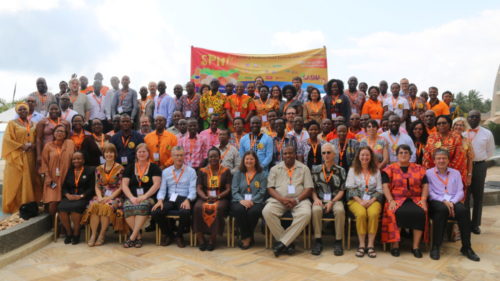
Over 100 delegates are meeting in Dar es Salaam, Tanzania, for the eighth annual Sweetpotato for Profit and Health Initiative (SPHI) technical meeting. The two-day (25-26 September) meeting brings together researchers, donors, policy makers, private sector actors, farmers and non-governmental organizations working along various sweetpotato value chains in 16 countries in sub-Saharan Africa.
Great start to the 8th Sweet Potato gathering with @Cipotato & partners https://t.co/9GsK0pRWK1
— DFID Ag Research (@DFIDAgResearch) September 25, 2017
“Sweetpotato’s ability to fit into a range of different agro-ecologies and its ability to use water efficiently, makes it a key ally in building resilient food systems,” said Dr. Hussein Mansoor, Director of Research and Development, Tanzania’s Ministry of Agriculture and Food Security who gave the opening address. He emphasized the contribution that the pro-vitamin A rich orange-fleshed sweetpotatoes could make in Tanzania. “In 2016, we found the prevalence of stunting among our children under 5 years of age was 42%, an unacceptably high figure. Only 9% of our children 6-23 months of age have a minimum acceptable diet”.
Delivering a keynote address at the meeting, Dr. Kiddo Mtunda from the Sugar Research Institute (SRI-Kibaha) highlighted progress in sweetpotato breeding and seedsystems in Tanzania. She highlighted breeding targets as follows: root yield of over 15 tonnes per hectare, maturity of four months or less after planting, tolerance to viral diseases at a score of 2 (1-5 scale), high beta carotene content of roots and leaves, high iron and zinc content of leaves, sugar content (low, moderate, high), dry matter of 20%-38% as well as dual purpose sweetpotato (leaf and root production). “To date, we have released 17 sweetpotato varieties. Of these, six are orange-fleshed sweetpotatoes (OFSP),” she noted.
Appreciate all the great partnerships towards reaching #10million households in #Africa with Vitamin-A rich orange-fleshed#sweetpotato https://t.co/zVz9bYJJMO
— Barbara Wells (@BarbaraWellsCIP) September 25, 2017
Over the two-day period, participants will engage in discussions on progress made across sweetpotato value chains such as seed systems, production, post-harvest technologies and marketing, in sub Saharan Africa in line with the meeting theme: building resilient food systems with sweetpotato. Players in the private sector who have engaged in value addition of OFSP will share their experiences. Prior to the meeting, sweetpotato innovations from Tanzania, Kenya, Uganda,Malawi, Rwanda, Ghana and Mozambique were displayed by International Potato Center (CIP) and partners as well as private sector entrepreneurs at Mlimani City—a popular shopping mall in Dar es Salaam— reaching over 500 people with successful OFSP based food products.
Participants will also undertake field visits on 27 -28 September with an aim to appreciate sweetpotato work in Tanzania on seed systems, root production as well as post harvest handling and processing.
SPHI is a 10-year multi-partner, multidonor initiative that seeks to reduce child malnutrition and improve smallholder incomes through effective production and diversified use of sweetpotato. SPHI is co-led by CIP and the Forum for Agricultural Research in Africa (FARA).
Thanks all our donors & partners who fund & support @Cipotato #OFSP @UKaid @USAIDGH @Irish_Aid @gatesfoundation @HelenKellerIntl @RTB_CGIAR pic.twitter.com/kBv8LquBsz
— Ackatia-Armah (@rackatia) September 25, 2017
